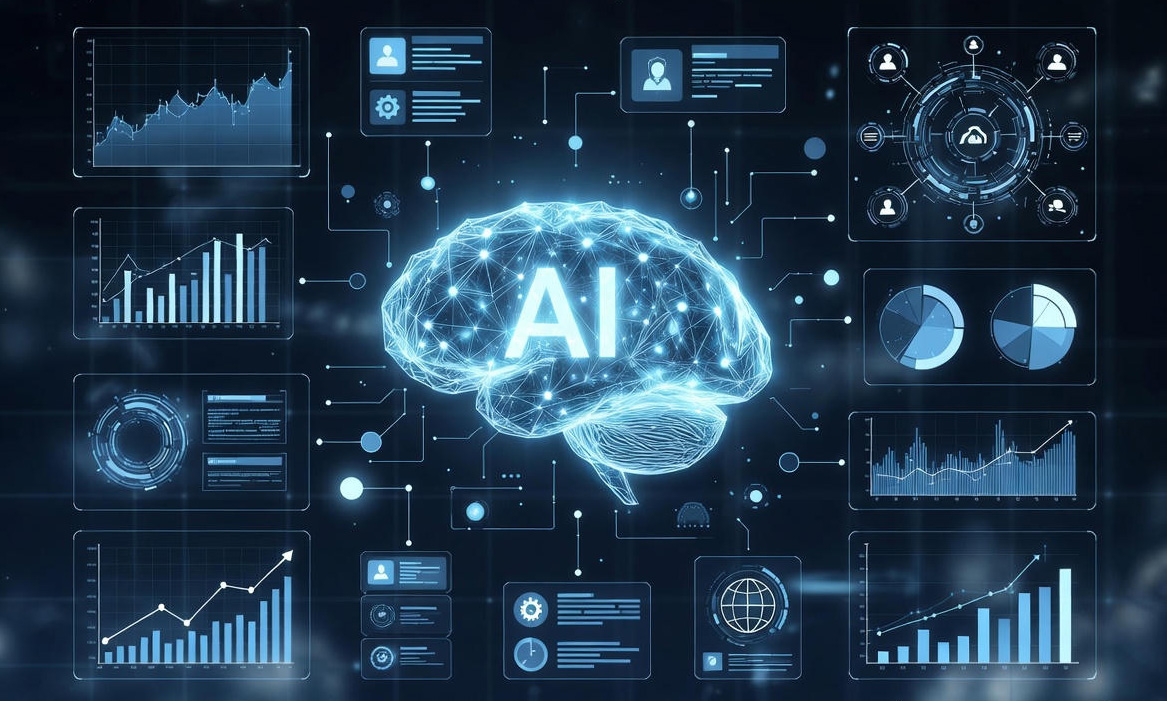Adapting to AI-Driven Search Engines: From SEO to GEO
The digital marketing landscape is experiencing a seismic shift. Search engines are no longer just matching keywords to web pages. They're now powered by sophisticated artificial intelligence that understands context, intent, and user behavior at an unprecedented level. This evolution is transforming how businesses approach online visibility, moving from traditional Search Engine Optimization to what experts are calling Generative Engine Optimization.
For businesses across North America, this isn't just a technical update. It's a fundamental change in how customers discover products and services online. Companies that adapt quickly will gain a competitive advantage, while those clinging to outdated strategies risk becoming invisible in search results.
The shift happened rapidly. Search engines now use large language models to generate comprehensive answers directly on the search results page. Users get immediate information without clicking through to websites. This changes everything about how businesses need to present their content online. AI SEO Services have evolved to address this new reality. Modern optimization now requires deep technical expertise in how AI systems interpret and prioritize information. It's no longer enough to stuff keywords into content and build backlinks. The algorithms are smarter, and they demand higher quality.
Google's Search Generative Experience, Bing's AI Chat, and similar features reflect this trend. These platforms use natural language processing to understand what users really mean when they type a query. They consider context, search history, and behavioral patterns to deliver personalized results.
The technology behind these changes is remarkably sophisticated. Machine learning algorithms continuously improve by analyzing billions of searches. They identify patterns in how people phrase questions and what information satisfies their needs. This creates a feedback loop that makes search engines increasingly accurate over time.
For marketers, this means optimization strategies must align with how AI systems evaluate content quality. The old tricks don't work anymore. Modern algorithms can detect thin content, keyword manipulation, and low-quality backlinks with remarkable accuracy.
AI systems analyze content at a deeper level. They evaluate whether information is comprehensive, well-researched, and genuinely helpful to users. They assess readability, structure, and how well the content answers specific questions. They even consider the author's expertise and the website's overall authority in its niche.
The key differences include: Artificial Intelligence in global HR management and recruitment. AI-powered talent acquisition, workforce analytics and automation in employee selection and human resources strategy.
Creating content for AI-powered search requires a fundamental mindset shift. The focus must move from pleasing algorithms to genuinely helping users. Paradoxically, this user-first approach is exactly what modern algorithms reward most heavily.
Artificial Intelligence in global HR management and recruitment. AI-powered talent acquisition, workforce analytics and automation in employee selection and human resources strategy.
Creating content for AI-powered search requires a fundamental mindset shift. The focus must move from pleasing algorithms to genuinely helping users. Paradoxically, this user-first approach is exactly what modern algorithms reward most heavily.
Comprehensive topic coverage has become essential. Rather than writing multiple thin articles targeting slightly different keywords, successful strategies involve creating authoritative pillar content that thoroughly addresses entire subject areas. AI systems recognize and reward this depth of coverage.
Structured data implementation helps AI systems understand content more effectively. Schema markup provides explicit signals about what information pages contain and how different elements relate to each other. This technical foundation allows search engines to extract and display content more accurately in AI-generated responses.
Natural language optimization matters more than ever. Content should answer questions the way real people ask them. Conversational tone and clear explanations help both human readers and AI systems grasp key concepts quickly. Complex jargon and convoluted sentence structures hinder comprehension for everyone.
AI-based SEO strategies leverage machine learning tools to identify content gaps and opportunities. These systems can analyze competitor content, search trends, and user behavior patterns to recommend topics that will resonate with target audiences. They can even suggest optimal content structures and formats based on what performs best in specific niches.
Investing in quality over quantity yields better results in this new environment. A single excellent piece of content that thoroughly addresses a topic will outperform dozens of superficial articles. Resources should shift toward creating fewer but significantly better assets that establish genuine authority.
Essential preparation steps include:
Voice search and visual search will expand significantly. Optimization strategies must account for how people speak queries naturally rather than type keywords. Image and video content will need robust metadata to ensure AI systems can interpret and surface them appropriately.
Multimodal search experiences will combine text, images, video, and audio. Content strategies must evolve beyond written articles to encompass diverse formats that appeal to different learning styles and use cases. Businesses that embrace this diversity will reach wider audiences more effectively.
Privacy considerations will shape how AI systems collect and use data. Regulations continue evolving to protect user information. Marketing strategies must balance personalization with respect for privacy boundaries. Transparent data practices will become a competitive advantage as consumers grow more privacy-conscious.
At MacRAE'S, we help businesses across Canada and the USA navigate these complex changes. Our team specializes in modern SEO strategies that align with AI-powered search engines. We combine technical expertise with creative content development to build comprehensive digital marketing programs that deliver measurable results. The shift to AI-driven optimization presents both challenges and opportunities. Businesses that adapt proactively will capture market share from slower-moving competitors. Those who wait risk losing visibility as search engines continue evolving.
The shift to AI-driven optimization presents both challenges and opportunities. Businesses that adapt proactively will capture market share from slower-moving competitors. Those who wait risk losing visibility as search engines continue evolving.
Success requires embracing change rather than resisting it. By focusing on providing genuine value, businesses naturally align with what AI systems reward. Technical optimization matters, but it supports rather than replaces high-quality content.
MacRAE'S brings decades of combined experience helping businesses across Canada and the USA enhance their digital presence. We understand the technical complexities of modern SEO while maintaining focus on business objectives. Whether you're a large corporation, SME, or family-owned business, we provide expert solutions tailored to your specific needs and budget.
The future of search is already here. The question isn't whether to adapt, but how quickly you can transform your approach to thrive in this AI-powered landscape.
For businesses across North America, this isn't just a technical update. It's a fundamental change in how customers discover products and services online. Companies that adapt quickly will gain a competitive advantage, while those clinging to outdated strategies risk becoming invisible in search results.
What Is Generative Engine Optimization?
Generative Engine Optimization, or GEO, represents the next frontier in digital marketing. Unlike traditional SEO which focuses primarily on ranking web pages, GEO optimizes content for AI-powered search experiences. These include AI overviews, chatbot responses, and personalized search summaries that appear before traditional blue links.The shift happened rapidly. Search engines now use large language models to generate comprehensive answers directly on the search results page. Users get immediate information without clicking through to websites. This changes everything about how businesses need to present their content online. AI SEO Services have evolved to address this new reality. Modern optimization now requires deep technical expertise in how AI systems interpret and prioritize information. It's no longer enough to stuff keywords into content and build backlinks. The algorithms are smarter, and they demand higher quality.
Why Are Search Engines Changing Their Approach?
Search engines are racing to provide better user experiences. People want quick, accurate answers without sifting through dozens of websites. AI-powered systems can analyze thousands of sources instantly and synthesize the most relevant information into digestible responses.Google's Search Generative Experience, Bing's AI Chat, and similar features reflect this trend. These platforms use natural language processing to understand what users really mean when they type a query. They consider context, search history, and behavioral patterns to deliver personalized results.
The technology behind these changes is remarkably sophisticated. Machine learning algorithms continuously improve by analyzing billions of searches. They identify patterns in how people phrase questions and what information satisfies their needs. This creates a feedback loop that makes search engines increasingly accurate over time.
For marketers, this means optimization strategies must align with how AI systems evaluate content quality. The old tricks don't work anymore. Modern algorithms can detect thin content, keyword manipulation, and low-quality backlinks with remarkable accuracy.
How Does AI-Driven SEO Differ from Traditional Methods?
Traditional SEO focused heavily on technical factors like meta tags, keyword density, and link quantity. While these elements still matter, AI-driven SEO prioritizes content relevance, user engagement, and semantic relationships between topics.AI systems analyze content at a deeper level. They evaluate whether information is comprehensive, well-researched, and genuinely helpful to users. They assess readability, structure, and how well the content answers specific questions. They even consider the author's expertise and the website's overall authority in its niche.
The key differences include:
- Search Intent Analysis: AI algorithms determine whether users want to buy something, learn about a topic, or find a specific website. Content must align perfectly with this intent to rank well.
- User Experience Metrics: Bounce rates, time on page, and engagement signals tell AI systems whether content satisfies user needs. Strong engagement signals boost rankings significantly.
- Semantic Relationships: Modern algorithms understand topic clusters and how different concepts relate to each other, rewarding comprehensive coverage over isolated keyword targeting.
- Content Quality Assessment: AI evaluates writing quality, factual accuracy, and information depth rather than simply matching keywords to queries.
What Content Strategies Work in an AI-Powered World?
 Artificial Intelligence in global HR management and recruitment. AI-powered talent acquisition, workforce analytics and automation in employee selection and human resources strategy.
Creating content for AI-powered search requires a fundamental mindset shift. The focus must move from pleasing algorithms to genuinely helping users. Paradoxically, this user-first approach is exactly what modern algorithms reward most heavily.
Artificial Intelligence in global HR management and recruitment. AI-powered talent acquisition, workforce analytics and automation in employee selection and human resources strategy.
Creating content for AI-powered search requires a fundamental mindset shift. The focus must move from pleasing algorithms to genuinely helping users. Paradoxically, this user-first approach is exactly what modern algorithms reward most heavily.
Comprehensive topic coverage has become essential. Rather than writing multiple thin articles targeting slightly different keywords, successful strategies involve creating authoritative pillar content that thoroughly addresses entire subject areas. AI systems recognize and reward this depth of coverage.
Structured data implementation helps AI systems understand content more effectively. Schema markup provides explicit signals about what information pages contain and how different elements relate to each other. This technical foundation allows search engines to extract and display content more accurately in AI-generated responses.
Natural language optimization matters more than ever. Content should answer questions the way real people ask them. Conversational tone and clear explanations help both human readers and AI systems grasp key concepts quickly. Complex jargon and convoluted sentence structures hinder comprehension for everyone.
AI-based SEO strategies leverage machine learning tools to identify content gaps and opportunities. These systems can analyze competitor content, search trends, and user behavior patterns to recommend topics that will resonate with target audiences. They can even suggest optimal content structures and formats based on what performs best in specific niches.
How Can Businesses Prepare for This Transition?
Adaptation starts with auditing current digital assets. Businesses need to evaluate whether existing content meets the higher standards that AI-powered search demands. This means assessing comprehensiveness, accuracy, readability, and user engagement metrics across all pages.Investing in quality over quantity yields better results in this new environment. A single excellent piece of content that thoroughly addresses a topic will outperform dozens of superficial articles. Resources should shift toward creating fewer but significantly better assets that establish genuine authority.
Essential preparation steps include:
- Technical Infrastructure Optimization: Ensure page speed, mobile optimization, and proper site architecture support AI crawling and interpretation effectively.
- Content Quality Enhancement: Audit existing pages for depth, accuracy, and comprehensiveness. Update or remove thin content that doesn't provide real value.
- Expertise Signal Building: Showcase credentials, earn quality backlinks from reputable sources, and consistently demonstrate subject matter knowledge through authoritative content.
- Structured Data Implementation: Add schema markup to help AI systems understand and categorize your content more accurately.
What Does the Future Hold for Digital Marketing?
The trajectory is clear. AI will become more sophisticated at understanding user intent and content quality. Search experiences will become increasingly personalized and conversational. Traditional search results pages may eventually become secondary to AI-generated summaries and recommendations.Voice search and visual search will expand significantly. Optimization strategies must account for how people speak queries naturally rather than type keywords. Image and video content will need robust metadata to ensure AI systems can interpret and surface them appropriately.
Multimodal search experiences will combine text, images, video, and audio. Content strategies must evolve beyond written articles to encompass diverse formats that appeal to different learning styles and use cases. Businesses that embrace this diversity will reach wider audiences more effectively.
Privacy considerations will shape how AI systems collect and use data. Regulations continue evolving to protect user information. Marketing strategies must balance personalization with respect for privacy boundaries. Transparent data practices will become a competitive advantage as consumers grow more privacy-conscious.
At MacRAE'S, we help businesses across Canada and the USA navigate these complex changes. Our team specializes in modern SEO strategies that align with AI-powered search engines. We combine technical expertise with creative content development to build comprehensive digital marketing programs that deliver measurable results.
Your Path Forward in AI-Powered Search
 The shift to AI-driven optimization presents both challenges and opportunities. Businesses that adapt proactively will capture market share from slower-moving competitors. Those who wait risk losing visibility as search engines continue evolving.
The shift to AI-driven optimization presents both challenges and opportunities. Businesses that adapt proactively will capture market share from slower-moving competitors. Those who wait risk losing visibility as search engines continue evolving.
Success requires embracing change rather than resisting it. By focusing on providing genuine value, businesses naturally align with what AI systems reward. Technical optimization matters, but it supports rather than replaces high-quality content.
MacRAE'S brings decades of combined experience helping businesses across Canada and the USA enhance their digital presence. We understand the technical complexities of modern SEO while maintaining focus on business objectives. Whether you're a large corporation, SME, or family-owned business, we provide expert solutions tailored to your specific needs and budget.
The future of search is already here. The question isn't whether to adapt, but how quickly you can transform your approach to thrive in this AI-powered landscape.








